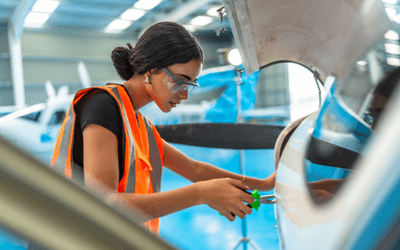Whether we are aware of it or not, or whether we like it or not, Artificial Intelligence is already making an impact on everyone’s lives, every single day. What’s more, AI is here to stay.
In industry in particular, AI applications are developing and being implemented at a rapid rate. Across STEM industries for example, they are being used to drive forward research, discovery and change the way companies and their people operate.
Having already discussed the impact of Artificial Intelligence on Engineers, in this article we’re going to delve a little deeper into how AI is shaping the development of techniques and materials used in Engineering now and will do in the future.
Artificial Intelligence’s Impact on Engineering Applications and Techniques
Engineering is constantly evolving. And so are the techniques being used within the industry.
Historically, any developments, advances and adaptations made to engineering techniques have been devised and driven by – with the support of the technology available to them, of course – the minds of expert, often genius engineers with hands-on experience and knowledge that enabled them to identify potential engineering challenges and what was needed to tackle them.
Today, Artificial Intelligence is playing a role too. The growing power of AI, which is constantly adapting and evolving, is helping to transform and optimise a wide range of engineering processes, functions and techniques.
AI Driven Design and Optimisation – Leveraging the power of AI’s machine learning and generative design capabilities, working in parallel with engineer’s existing expertise and experience, allows complex engineering processes and tasks to be more efficient, sustainable and innovative.
Predictive Maintenance and Asset Management – Another way in which Artificial Intelligence is driving engineering efficiency and reliability; by studying data and predicting patterns, AI can help to discover problem areas before they even arise, which can reduce downtime, maintenance costs and free-up time.
Collaborative Robotics and Human-Machine Synergy – Artificial Intelligence robots learn from humans as much as they can teach them and can adapt to the parameters of certain situations and tasks to complete and perform them – alongside humans – to a remarkably high standard.
AI-Enhanced Safety and Risk Management – AI has the power to help take health and safety management to the next level, through identifying potential risks and suggesting potential outcomes and countermeasures, which can then be put into place in relevant processes and functions.
AI in Education and Skill Development – Engineering is evolving and developing all the time, requiring the development and learning of new skills, processes and knowledge. Utilising AI to identify potential new skills and processes that may be required in the future gives engineers a potential head start, allowing them to nurture such skills ahead of the time they may be needed.
Artificial Intelligence’s Impact on Engineering Materials and Development
The demands of engineering, and therefore the expectations of engineers and their work too, are constantly growing. Engineering projects require efficiency and a dedication to working to set parameters and deadlines, reducing time to completion where possible, whilst always maintaining the highest standards.
This is why the materials that engineers have at their disposal are so integral to the work they do; stronger, lighter, easier to use and more resilient materials can help engineers develop and use new techniques and applications, aid efficiency and ease-of-working, and increase the quality of production and product.
So does the power of Artificial Intelligence, and how it can be applied to discover the new and improve the old, have a role to play in the discovery and development of materials and material engineering? According to IEEE, the world’s largest technical professional organization dedicated to advancing technology for the benefit of humanity, “quite possibly”.
In their piece on How Artificial Intelligence Will Influence Materials Engineers, Jennifer D. Bosavage discusses how AI is already influencing material discovery and production, and how it will do in the future too. They highlight how AI can be used to deduce existing ‘recipes’ for particular materials and discover potential ways of developing these materials further, based on specific requirements and applications; the ability to dramatically accelerate new material development and production overall; and how, with the assistance of robotics and machine learning, AI can increase efficiency by reducing the need for ‘trial and error’ based research that is usually undertaken by humans.
And, as Amil Merchant and Ekin Dogus Cubik of Google DeepMind highlight, Artificial Intelligence’s influence on material development isn’t only theoretical. In fact, millions of new materials have been, and will continue to be, discovered with AI-driven deep learning. AI tool GNoME has been used to find 2.2 million new crystals, including 380,000 stable materials that already show promise for their potential to be applied to a wide range of engineering applications that could power the development of future transformative technologies ranging from superconductors, super computers and batteries for computers, green energy, electric vehicles and much more.









